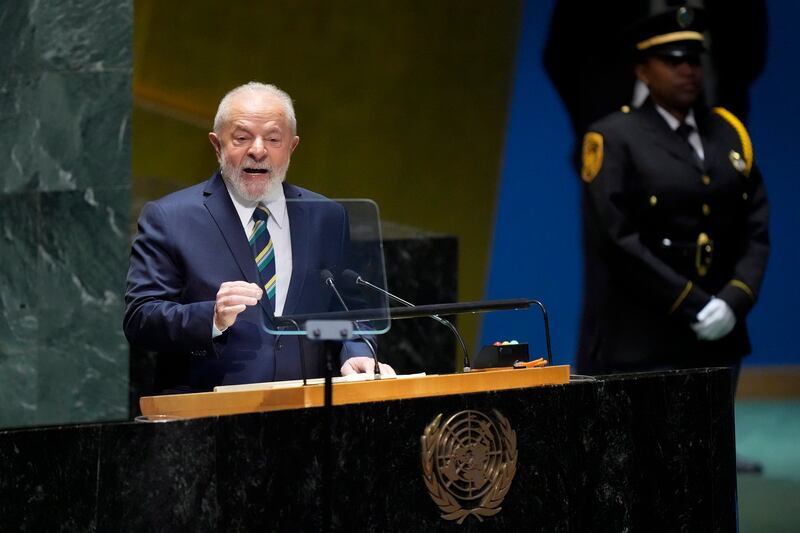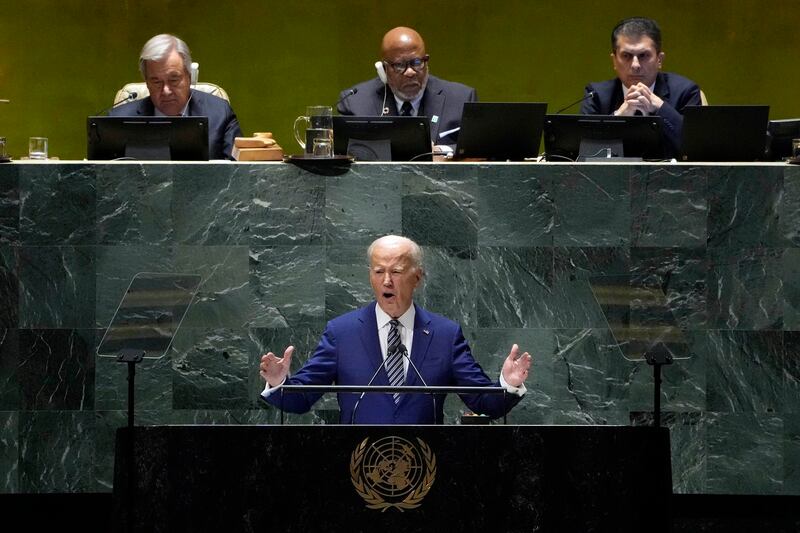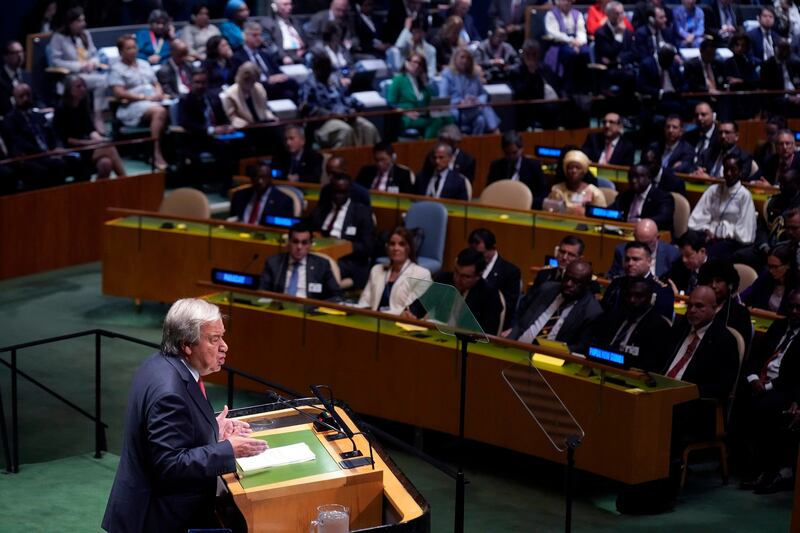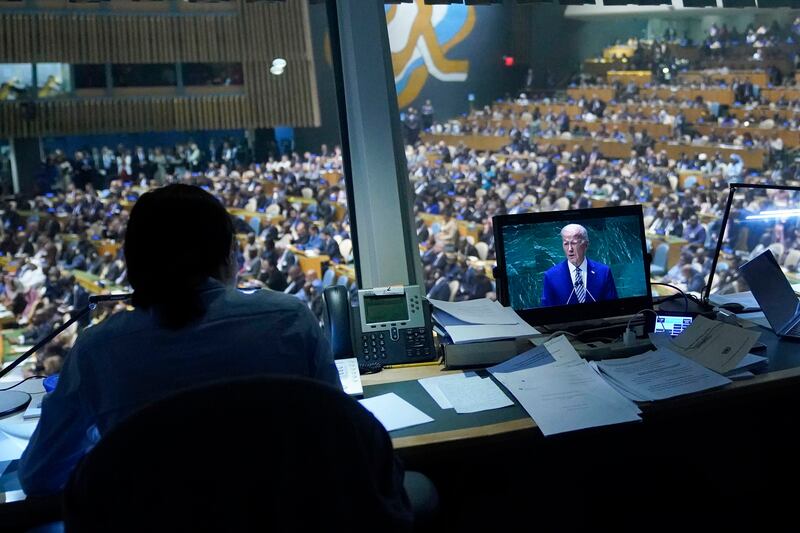U.N. Secretary-General Antonio Guterres and U.S. President Joe Biden used their speeches on the opening morning of the annual U.N. General Assembly in New York on Tuesday to call for reforms of the global body’s central institutions amid multiple global crises.
The assembly is meeting for general debate from this Tuesday to next, and opened with a fiery speech from Brazilian President Luiz Inácio “Lula” da Silva, who pledged to use next year’s G-20 meeting in Rio de Janeiro to put the world’s inequitable development on the agenda.
“The 10 richest billionaires have more wealth than the poorest 40% of humanity,” Lula said, noting the U.N.’s 2030 Sustainable Development Goals, a focus of this year’s assembly, were the world over far from being reached and could turn into the global body’s “biggest failure.”

“The destiny of every child born on this planet seems to be decided while they're still in their mother's womb,” he said. “The part of the world where their parents live and the social class their family belongs to will determine whether or not that child will have opportunities.”
‘Lost ground’
Biden, speaking after Lula, also acknowledged the failure of the world to make enough progress on the SDGs, which are now halfway due.
“These goals were adopted at the United Nations in 2015 as a roadmap for improving lives around the world,” Biden said. “The hard truth is, after decades of progress, the world has lost ground these past years, in the wake of COVID-19, conflict and other crises.”
He called for fundamental reforms to the United Nations, and said his administration “will support expanding the Security Council, increasing the number of permanent and non-permanent members.” But he said the body, despite its flaws, was still key to world security and peace.
“The institutions we built together at the end of the Second World War are an enduring bedrock of our progress,” Biden said.

Speaking in opening remarks before debate opened, Guterres also raised the U.N. Security Council’s decades-old membership structure, which has resisted change even as it has been criticized by the Global South and emerging powers as antiquated.
The U.N. Security Council’s five permanent members have since 1945 been the victors of World War II: China, France, the United Kingdom, the United States and Russia, which took the Soviet Union’s seat in 1991. Each has the power to unilaterally veto the council’s binding resolutions.
Guterres told the assembly that the “world has changed” since then, “but our institutions have not,” deepening the United Nations' struggle to effectively deal with crises of poverty, climate change and conflict.
"A multipolar world needs strong and effective multilateral institutions. Yet global governance is stuck in time. Look no further than the United Nations Security Council and the Bretton Woods system," he said. "They reflect the political and economic realities of 1945, when many countries in this assembly hall were still under colonial domination."
“If institutions do not reflect the world as it is, [then] instead of solving problems, they risk becoming a part of the problem,” he added.
Great fragmentation
Guterres also noted that the world was again dividing into multiple competing power blocs amid tensions between the United States, Russia and China, and was “inching ever closer to a great fracture in economic and financial systems and trade relations.”
“When that threatens a single open Internet, with diverging strategies on technology and artificial intelligence, and potentially clashing security frameworks, it is high time to renew multilateral institutions based on 21st Century economic and political realities,” he said.

To that end, he proposed a new U.N. body on artificial intelligence to guide governance of the technology, to prevent countries like China and the United States from inadvertently developing technology dangerous for the whole world in a race to outdo each other. He said the body would be like the International Atomic Energy Agency, an intergovernmental agency that does not have binding powers.
During his speech, Biden referenced the growing great power rivalry, too, noting that U.S. policy was not “about containing any country” and that he wanted to “responsibly manage the competition” with China to avoid conflict, but that international law had to be defended.
He also said the world "cannot turn away from abuses whether in Xinjiang, Tehran, Darfur, or anywhere else," and argued that Russia's invasion of Ukraine was testing the waters of a new world order where "core tenets of the U.N. Charter" no longer have any relevance.

“Certain principles are an international system, are sacrosanct: sovereignty, territorial integrity, human rights,” Biden said.
“If we abandon the core principles of the United Nations to appease an aggressor, can any member state in this body feel confident that they are protected?” he said. “If you allow Ukraine to be carved up, is the independence of any nation secure? I'd respectfully suggest the answer's no. We have to stand up to this naked aggression.”
The remarks spoke to the issues faced by the global body as the General Assembly sits for the 78th time since its creation in 1945, amid renewed war in Europe and the emergence of China as a power.
Guterres, during his speech, said he was under “no illusions” about the ease of reforming the United Nations when three of its most powerful members – Russia, China and the United States – were at odds.
“Reforms are a question of power,” he said. “I know there are many competing interests and agendas, but the alternative to reform is not the status quo. The alternative to reform is further fragmentation.”
Edited by Malcolm Foster.
